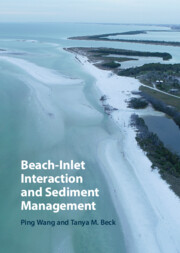Book contents
- Beach–Inlet Interaction and Sediment Management
- Beach–Inlet Interaction and Sediment Management
- Copyright page
- Contents
- 1 Introduction
- 2 Beach and Inlet Systems under Different Geological and Oceanographic Settings
- 3 Hydrodynamics and Sediment Processes Applicable to Beach–Inlet Systems
- 4 Sedimentology and Morphodynamics of Beach–Inlet Systems
- 5 Interaction of Beaches and Inlets
- 6 Methods to Mitigate Beach Erosion and Ensure Inlet Navigation Safety
- 7 Regional Sediment Management at Beach–Inlet Systems
- 8 Resiliency of Beach–Inlet Systems Facing Sea-Level Rise, Storm Impacts, and Human Stresses
- References
- Author Index
- Subject Index
2 - Beach and Inlet Systems under Different Geological and Oceanographic Settings
Published online by Cambridge University Press: 15 September 2022
- Beach–Inlet Interaction and Sediment Management
- Beach–Inlet Interaction and Sediment Management
- Copyright page
- Contents
- 1 Introduction
- 2 Beach and Inlet Systems under Different Geological and Oceanographic Settings
- 3 Hydrodynamics and Sediment Processes Applicable to Beach–Inlet Systems
- 4 Sedimentology and Morphodynamics of Beach–Inlet Systems
- 5 Interaction of Beaches and Inlets
- 6 Methods to Mitigate Beach Erosion and Ensure Inlet Navigation Safety
- 7 Regional Sediment Management at Beach–Inlet Systems
- 8 Resiliency of Beach–Inlet Systems Facing Sea-Level Rise, Storm Impacts, and Human Stresses
- References
- Author Index
- Subject Index
Summary
Although barrier islands occur under a variety of coastal settings, coasts with an ample supply of sand-sized sediment, a wide and gentle continental shelf, and a broad coastal plain are more conducive to the formation of barrier islands. When the above three conditions, combined with a slow sea-level rise rate of 1–3 mm/year, occur, barrier islands can be the dominant coastal features, such as along the US Gulf of Mexico and Atlantic Ocean coasts. Although not as common, barrier islands also occur along rocky coasts and river-delta coasts. This chapter discusses different morphologic and sedimentologic characteristics under different geologic and oceanographic settings. The various sub-environments, also referred to as morphologic features, that compose a barrier–inlet system are described, along with a morphodynamic classification of barrier island under different coastal settings. These morphologic features and the morphodynamic classification are used in the following chapters discussing sediment transport processes, sediment exchange among the different features and the associated pathways, and management of the sediment resources among the various morphologic features.
Keywords
Information
- Type
- Chapter
- Information
- Beach-Inlet Interaction and Sediment Management , pp. 8 - 38Publisher: Cambridge University PressPrint publication year: 2022
